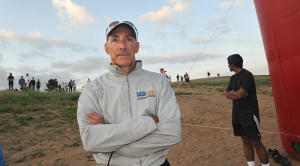[This is the second half of an article published one day earlier. Click for Part 1 of this article.]
Most of what you need to know to understand the dynamics behind this ongoing Board fight is that each side is scratching and fighting – and spending – to try to eke out 1 or 2 more board seats for its side.
Steve Sexton's first lawsuit against USAT – at least that part seeking to gain access to Board member-to-member emails – appears to have been a fishing expedition to find incriminating or embarrassing emails. He caught a few.
During the 3-week period between October 1, 2012, when the Board was notified of that Melissa Merson really should have been a voting member of USAT's board for most of the last 3 years, until October 23rd, when her term on the ITU executive board expired and she would no longer enjoy voting status on USAT's board, a number of attempts by the elites to call special board meetings were unsuccessful.
In one board member-to-member email we read, "Delay is our best weapon here." Emails suggest a Board strategy of denying a quorum whenever the special meeting topic was Melissa Merson's voting eligibility, and the possibility that her eligibility might trigger a 4th elite athlete representative on the Board.
Whether this stalling tactic was a violation of USAT's bylaws or of California corporate law I do not know. But no legal action or peril to the Board majority, or resolution favoring the elites, has been evident since that tactic by the Board majority was unearthed. In other words, while Mr. Sexton was successful in exposing an embarrassing chapter in USAT's board governance, I can find no benefit the athletes derived.

Further, none of this behavior was made public. By either side.
What did the Board make public to its members? All eligible voters – annual members – were asked to vote for a number of bylaw changes, and each side weighed in, in some cases on Slowtwitch. Opinion pieces by Board members were written, and ballot measures were explained, on why the Federation needs to move to Colorado; on why the "Sunshine Policy" needed to be amended, or to not be amended; on why the percentage of elites on the Board should be changed from 25 percent to 20. But no one – on either side – provided context. Members were asked to blithely cast a vote ignorant of the real issues motivating the two Board cohorts.
USA Triathlon's Board majority responded to Mr. Sexton's first lawsuit by sending him to Hearings & Appeals, alleging a number of Code of Conduct breaches. Mr. Sexton responded to that by filing a second lawsuit against the Federation in August of 2014, accusing it of harassment.
USAT has responded to that lawsuit by filing an anti-SLAPP lawsuit, which by Wikipedia definition associates Mr. Sexton with filing suits "intended to censor, intimidate, and silence critics by burdening them with the cost of a legal defense until they abandon their criticism or opposition."
Most SLAPP lawsuits are considered meritless or are likely to lose in court; they are just intended to harass. Mr. Sexton's first lawsuit doesn't fit that model, since he, by his own definition in his second lawsuit, "prevailed in part" with his first lawsuit.
However, one effect of his first lawsuit is that now board members on all sides are very circumspect in their speech, both in and out of board meetings. "It got to the point I was very careful of what I said in a board meeting," said one former board member, "for fear of getting sued by another board member."
A fun exercise for USAT annual members is to ask your USAT Board representative questions about these themes. If you are frustrated in your attempt to get any substantive answers reflect on the fact that a number of these Hearings & Appeals cases winging back and forth include a specific Code of Conduct breach: "Disclosure of Confidential Information. Any intentional or reckless disclosure of material USAT confidential information."
What is confidential? The best I can divine is that it's whatever the Board decides is confidential. Some members refer to a "gag order" imposed on them, and decline to comment on Board business because of this.
For this board to maintain, and enforce, such stringent confidentiality exists in tension with the first principle written in USAT's Code of Ethics and Conduct: "Maintaining clear and high standards of accountability and transparency." But the fear of getting slapped with a censure for breaching confidentiality – ignoring the requirement for transparency in that same document – is a major factor in why none of this has become widely known previously. A number of critics of USAT's Board majority claim this fear of a breach of confidentiality is why few know of the Board's Four Corners Stall in October of 2012.
Jarrod Shoemaker, Champion Of The Minority Cohort
Elite athlete Jarrod Shoemaker (pictured above) filed yet another lawsuit against the Federation last week, meaning their are now 3 such lawsuits between USAT and those inside its circle of board members or high performance athletes ongoing as of this writing. The main contention, according to Mr. Shoemaker's attorney Howard Jacobs, is that a class cannot have its rights diminished unless approved by that class. Specifically, according to the suit, USAT cannot reduce the elite athlete minimum threshold from 25 to 20 percent just by a vote of the entire USAT membership (which USAT did, or attempted to do, during the last general election).
But getting a California judge to consider Mr. Shoemaker's case, filed in 2014, a valid California case seems iffy. On the very ballot that Mr. Shoemaker claims does not pass legal muster was a resolution - passed by the membership - finally dissolving the shell corporation that once housed USAT. Tax returns show that USAT has not conducted any business in California since 2012. Mr. Shoemaker's suit was filed in the same court Mr. Sexton used for his lawsuits, so the reasoning could be that a judge already having accepted jurisdiction in Mr. Sexton's case might accept jurisdiction in Mr. Shoemaker's case.
But Mr. Jacobs says that neither California nor Colorado corporate law allows the disenfranchisement of a minority class of shareholders by the majority, so, if a California judge throws out this case for lack of jurisdiction it is likely to be brought again in Colorado court.
Multiple Hearings & Appeals processes have been brought by USAT against Mr. Sexton. At least one against him is currently ongoing. These are heard by a panel of volunteers and there have been enough of these - with as many as two more hearings against other current or former board members contemplated - that it's getting hard to find qualified volunteers to sit on these panels. According to one observer close to the process, there are so many of these hearings that "We're close to exhausting everybody qualified we can put on a panel."
These hearings, as well as arbitrations, could be informal, or very formal with lawyers on each side. It has been typical for the subjects or defendants of these processes to bring lawyers, hence causing everyone on all sides to incur significant legal fees.
One might ask why the elite athletes keep voting Steve Sexton onto the board if he is, for good or ill, the fulcrum around which a lot of legal battles, and fees, spin. He is, according to those who serve with him, a leader. Charismatic. Extremely persuasive. Very smart. Truly believes in the cause of right, and that he is on the side of right. I have intentionally used only the superlatives describing Mr. Sexton coming from those who oppose him. One of his opponents described him this way: "If you gave Steve 15 minutes with somebody staunchly on the other side, after than 15 minutes Steve might not make a convert, but he'd have that person thinking."
To be sure, these aren't the only adjectives used by his detractors to describe him.
Mr. Sexton holds a PhD in economics, and it appears he represents himself in his suits against USAT. He might be authoring the text of his own lawsuits, and one who knows and is close to him told me he did author his first lawsuit. It's no wonder that the elites choose him when he's a champion of their cause, when it's so difficult to find even one elite willing to serve as an elite board member.
If You Leave Now, I Won't Be Here When You Get Back!
When USAT's Board next meets, just shy of 2 weeks from this writing, one item very likely to be on the meeting agenda is whether to grant the Governance Committee the job of analyzing the effect on the Federation of handing off the Olympic development part of USAT to the USOC. This is the same route taken by a cohort of the Board in 2004 (those interested in this ancient history can read my characterization of events back then written at that time).
As was the case a decade ago, the likelihood that any USAT board majority would actually vote to dissociate with the Olympic program is very remote. It's not a serious proposal. It's a tantrum, brought on through exasperation with the elites. But Mr. Shoemaker's new lawsuit might make that tantrum louder and angrier.
The thoughtful spectator would not blame one side or the other or any person in particular for this failure to get along and work together; to do so would be intellectually lazy. Each side makes strong cases for what is just, prudent and efficient. Both sides contain hardworking volunteer board members trying to keep USAT moving forward. The problem is that neither side admits to the validity of other side's argument, and the righteous stand – damn the cost in time and treasure – is a lot easier when somebody else is paying the lawyer.


